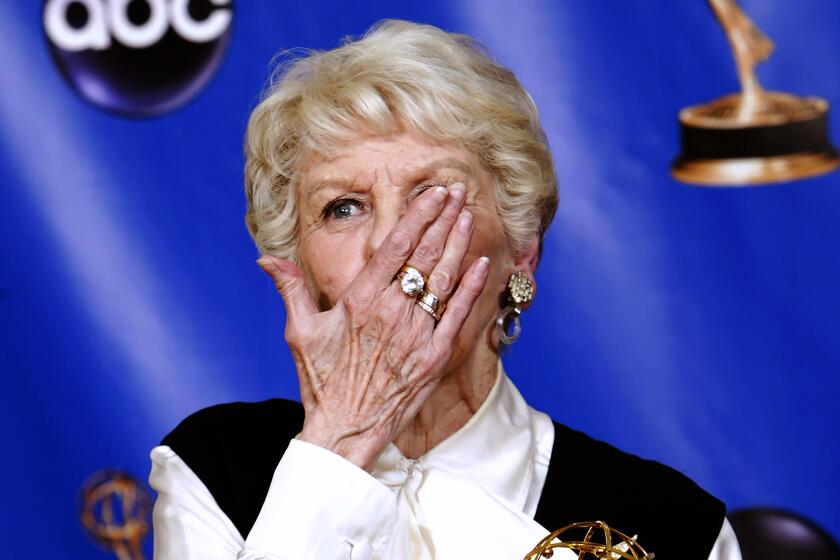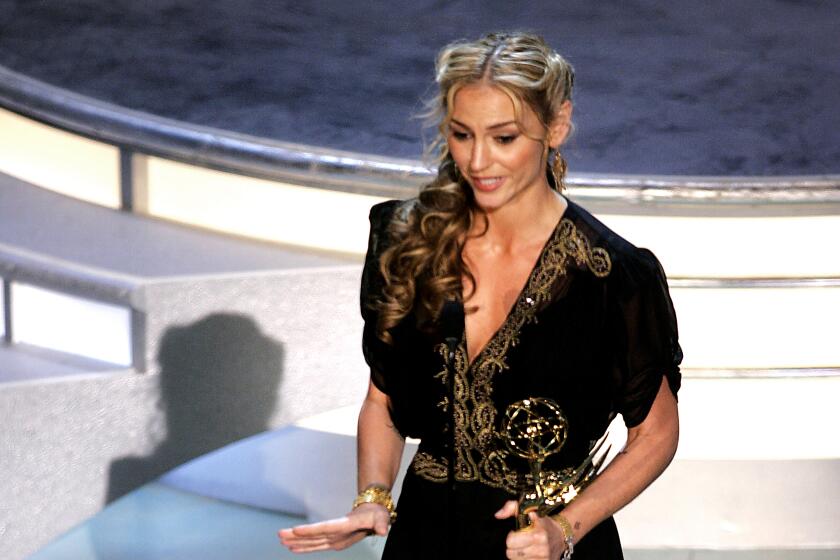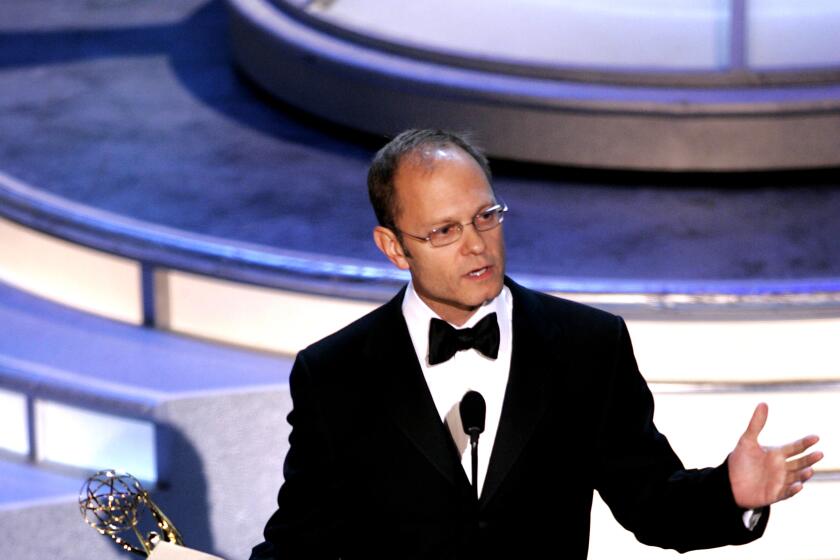The gift of growing pains
Every so often in the collaborative art called television a little miracle happens. There is a meeting of minds, a confluence of vision, a gathering of particular talents. The planets align, the cards fall into place, and something is born whose worth is instantly apparent to all involved, not as a generator of revenue -- at which it might fail completely -- but as an ennobling refraction of some little bit of the Truth, of what it means, or could mean, to be alive. Each department pushes the others a little bit harder; excellence from one corner prompts ambition in another. What might have begun as just the next greenlighted project or available job becomes a sort of holy mission, even if none of the participants would ever dare call it that -- this being, after all, only television.
Back in the early 1990s, various strains of luck and intention came together to make “My So-Called Life,” a show about a teenage girl (played by an astonishing Claire Danes), her family and friends. It lasted 19 episodes, starting in summer 1994, on ABC, before its cancellation. Some people still haven’t quite gotten over that. But like a short-lived rock band whose legend spreads in its posthumous wake, the show’s influence upon a generation’s sense of itself has only grown since, through repeated showings on MTV (and later Fox Family and the N) and on video. This week sees a lovingly packaged DVD rerelease of the complete series that adds depth-plumbing commentary tracks, a disc of first-rate extras and essays by creator Winnie Holzman and fans such as Joss Whedon and Janeane Garofalo. I will not do it the injustice of calling the show perfect; it’s too messily alive for that.
In its parts it may have resembled things that came before, but in its sum it was unique, as one would say every life is unique, and yet part of some universal chord. A nonjudgmental mix of journalistic and spiritual attitudes, “My So-Called Life” at once romanticized and accurately portrayed what it is to be young and changing, to be elevated and wrecked by the same powerful emotions, and it did it without descending into melodrama or selling soap. It was, in fact, a quiet show, devoted to long takes, long looks, long silences. But constantly . . . vibrating.
Watching it then and now, what is most immediately evident is the respect paid to its main subject: the emotional life of teenagers. Some of that just has to do with the high production values -- executive producers Marshall Herskovitz and Edward Zwick brought to “My So-Called Life” the same cinematic gloss they had earlier applied to “thirtysomething” (without making it look slick). But it goes deeper: From the whispered “Go. Now. Go!” that slings each episode into action, the series taps something deep and urgent and so brimming with feeling that when the action suddenly glides into a wider sort of reality -- as in a Halloween episode, with ghosts, and a Christmas episode, with singer Juliana Hatfield as a grunge angel -- it never violates the show’s fundamental honesty.
The classic rites and rituals of adolescence, the kinds of hot-button issues that animate after-school specials, the socio-farcical representation of cliques and characters that fill up sitcoms and rowdy teen flicks -- these things exist here as color and texture and as an occasion for reflection or for comedy. (It’s a funny show.) But most everything important takes place in the space between the characters. The real story arc is defined by these waxing, waning distances and nearnesses, by the growth or withholding of affection. They are often cruel to one another, these kids, yet desperate to connect. It’s a show about finding oneself but very much about finding oneself in other people: the search for identity as inextricable from the search for love.
At the center of this pocket maelstrom is Dane’s Angela Chase, a suburban Pittsburgh high school sophomore who has decided to change her life. She has two new, unconventional friends: wild child Rayanne (A.J. Langer) and “sexually ambiguous” Rickie (Wilson Cruz), to use Holzman’s original description, whom she has adopted or has allowed to adopt her, sensing that that way lies freedom: “So I started hanging out with Rayanne Graff, just for fun,” Angela says, as the narrator of her own story. “Just ‘cause it seemed like if I didn’t, I would die, or something.” (Characters in “My So-Called Life” are always saying “or something” or “or whatever,” as though it were good never to be too committal.)
She has additionally decided that she is in love with Jordan Catalano (Jared Leto), who has been “held back -- twice.” He is beautiful to behold, soulful in a kind of dim way, at home in his skin yet bound by the conventions of his crowd. And there are also Sharon (Devon Odessa), Angela’s temporarily abandoned friend -- she represents the sort of normal aspiration that Angela has half-forsworn -- and awkward, over-analytical, judgmental Brian (Devon Gummersall), who suffers in unrecognized love for Angela. Brian makes the mistake of identifying goodness with “good behavior” -- that they are not the same thing is a point the series makes repeatedly.
Muddying the waters
Angela treats him worse than he deserves. She is a strange sort of heroine. She can be sullen, selfish. She bullies or ignores her little sister (Lisa Wilhoit); she keeps her parents (Bess Armstrong, tight; Tom Irwin, loose) at arm’s length, except when she needs them closer. She betrays her friends but can be unforgiving when betrayed herself. She lies. She’s smart but without experience and not quite ready to surrender her innocence. Cutting class, kissing, coming home late -- that’s about as extreme as Angela gets. And while other kids are having sex in this series (off-camera), they are not necessarily having much fun at it. “Sex was this thing people ‘had,’ like a rash,” Angela observes, from a distance. “Or a Rottweiler.”
Looking back from a day when the people who make television reflexively treat sex as the ultimate -- yet somehow disposable -- good, her desire to take it seriously, even to the point of refusal, seems marvelously radical and real. “ ‘Cause it is a big deal. I mean, sex made your whole life start,” she tells Jordan, as their halting relationship founders on her hesitation. This is not “Gossip Girl.”
At the same time, she’s full of love, of life, possessed of a radiance and centeredness that is certainly Danes’ own; she was 13 when the pilot was shot, and turned 15 while the series was in production, and there is no argument among her peers, as interviewed for the new DVD set, that she is some sort of unaccountable genius. (“An old soul,” more than one adult colleague calls her.) It’s not right to say that “My So-Called Life” owes everything to Danes, or to let her brilliance obscure her cast mates, each of whom was equally right for his or her role. But it’s hard to say what it would have been without her.
Gorgeous without being pretty, bundled against the world and the cold in late-grunge plaid and big boots -- Kurt Cobain died four months before the series began -- Danes’ Angela embodies the lows and highs of her coming of age. “Sometimes, it seems like we’re all living in, like, some kind of prison and the crime is how much we hate ourselves.” But it’s good, she says, to “admit the truth: that when you look closely, people are so strange and so complicated that they’re actually beautiful -- possibly even me.”
Though the final episode of its first and only season was written as though the series would return, there is an open-ended rightness to its abbreviation: What doesn’t end, goes on. As in life, we’re left in transit, in transition, with questions hanging. But we’ve been given enough: the world in 19 hours. As Angela says in the fan-canonized lines that cap the pilot episode, confirming Rayanne’s description of their last night’s adventure, “We had a time.” Which is all anyone gets out of this so-called life: A time, to have.
Or something.
--
The complete guide to home viewing
Get Screen Gab for everything about the TV shows and streaming movies everyone’s talking about.
You may occasionally receive promotional content from the Los Angeles Times.




